|
6 St. George's Street
Canterbury
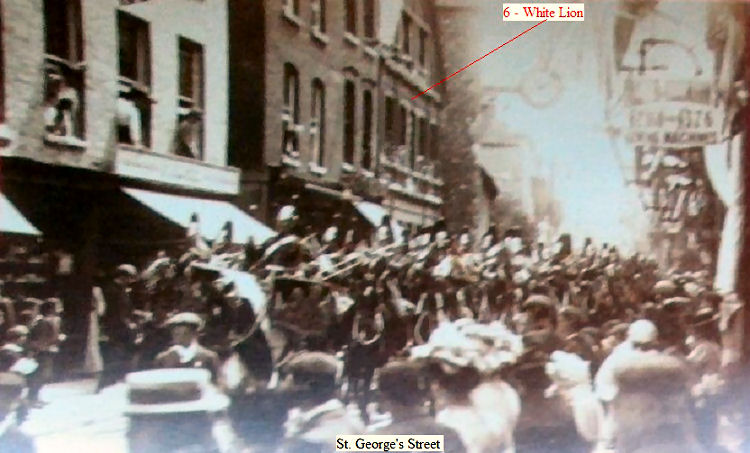
Above photo circa 1904, kindly sent by Rory Kehoe. |
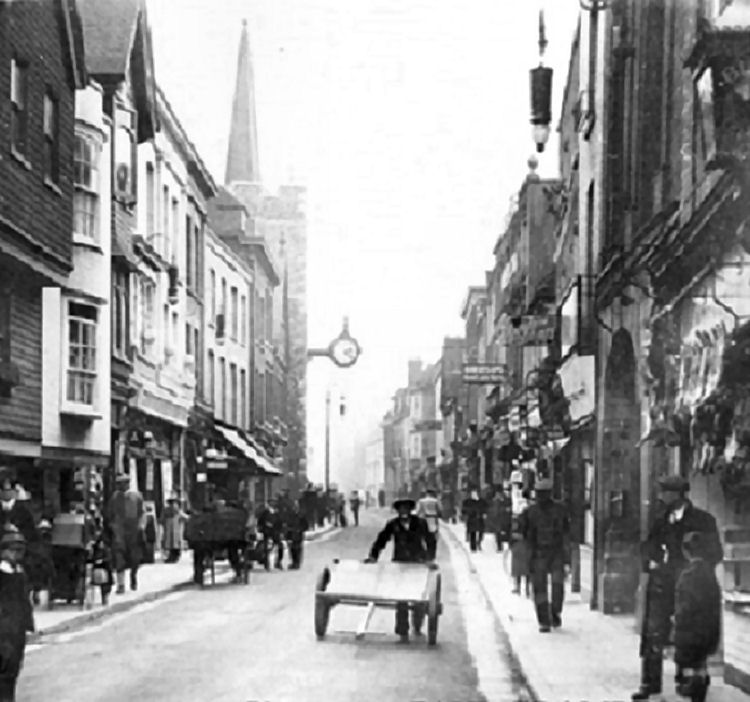
Above photo circa 1907, kindly sent by Rory Kehoe. Pub is just to the
left of the clock tower. |
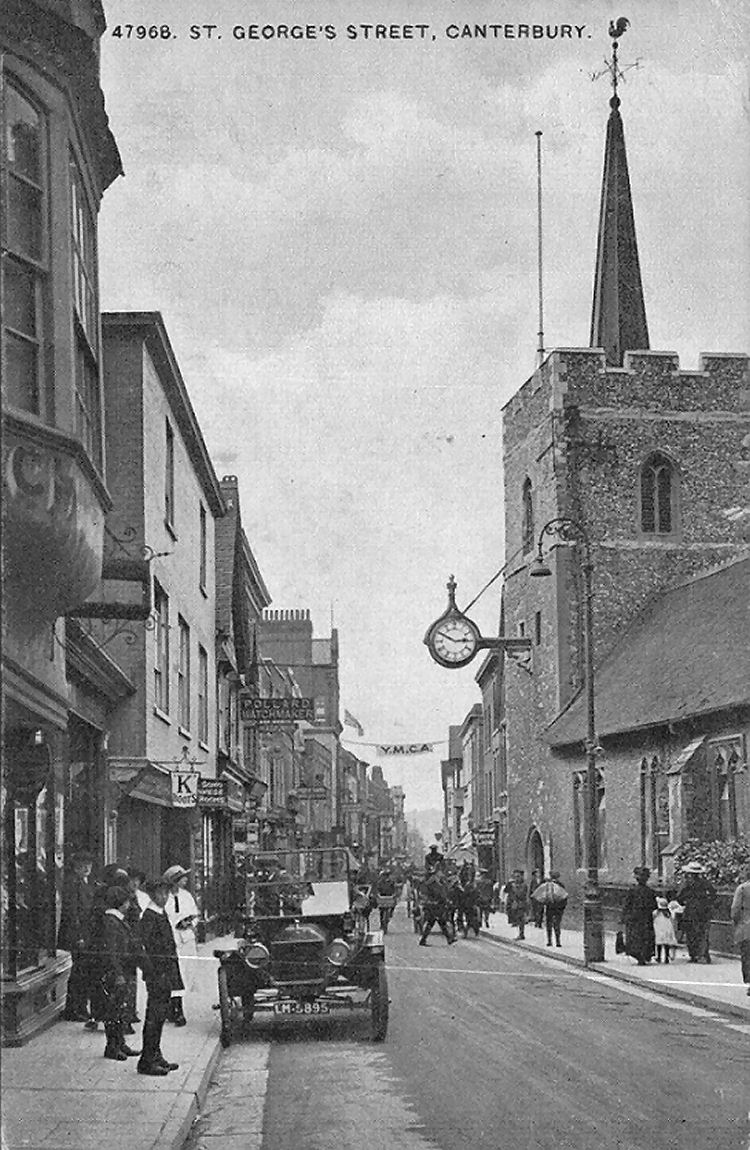
Above postcard circa 1910, kindly sent by Rory Kehoe. |
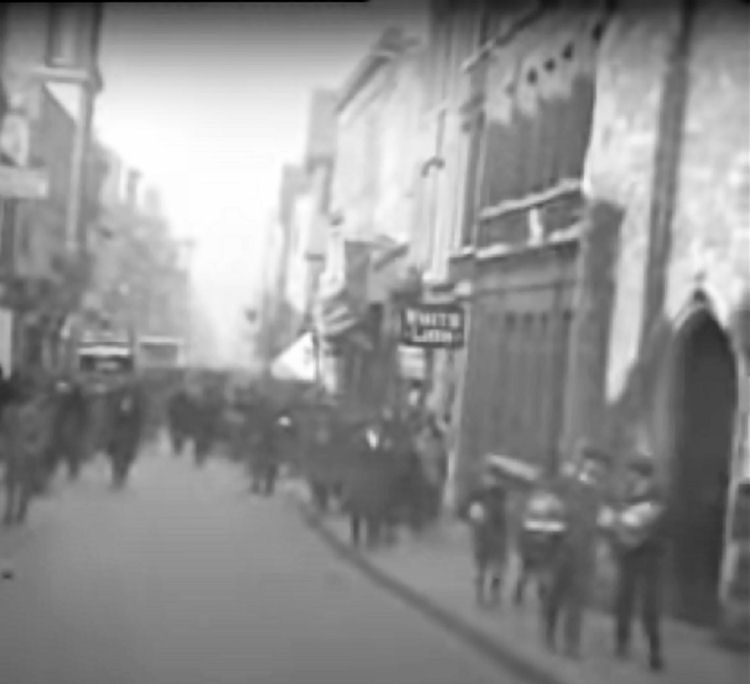
Above photo circa 1920, kindly sent by Rory Kehoe. |
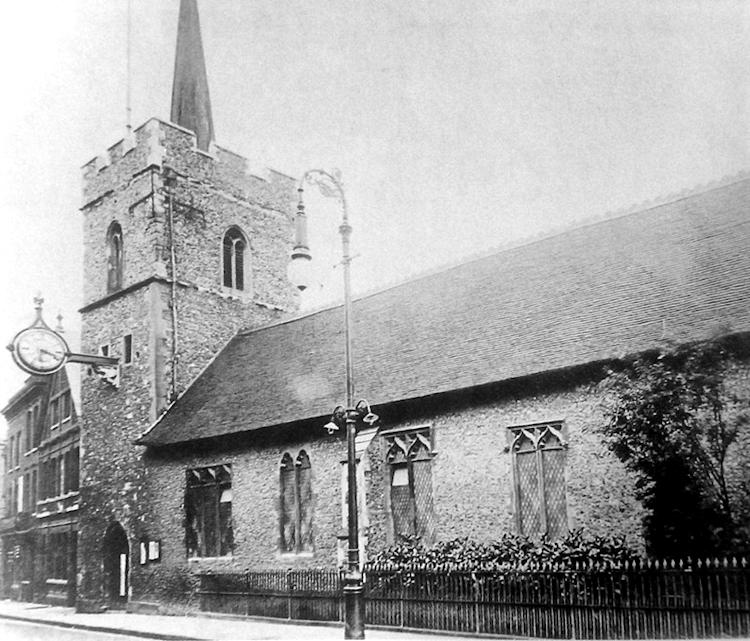
Above photo circa 1925, kindly sent by Rory Kehoe.
Shown to the left of St. George's tower. |
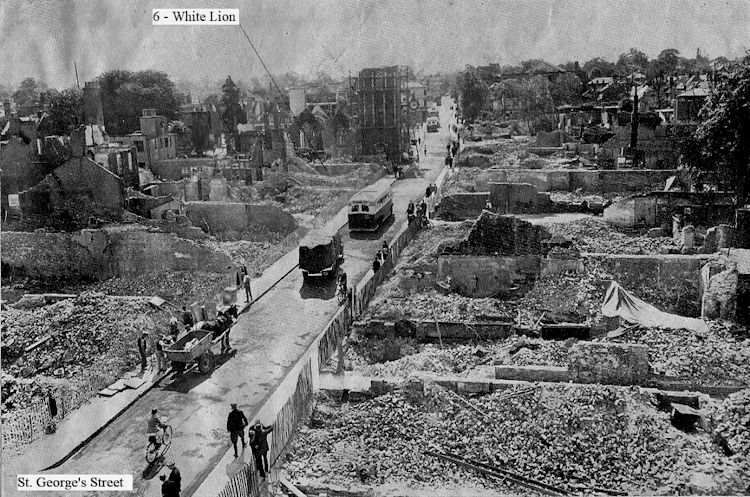
Above photo June 1942, kindly sent by Rory Kehoe. Showing the
devastating effect of the Luftwaffe's Baedeker Raids on the city centre.
As can be seen, the completely flattened "White Lion" was only one of
many casualties of the 1st June bombing. |
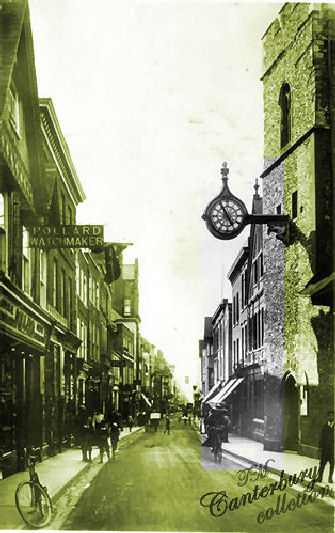
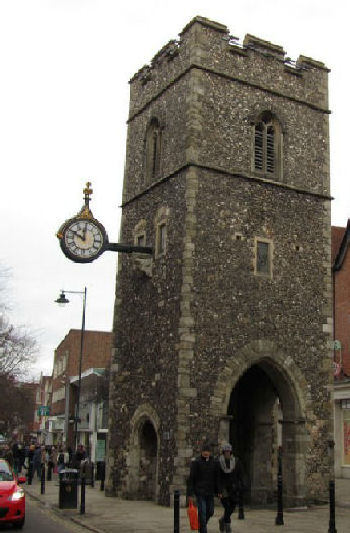
Photo on the left from the Historic Canterbury web site shows the "White Lion",
highlighted in greyscale, and the photo on the right,
shows where it would be today. |
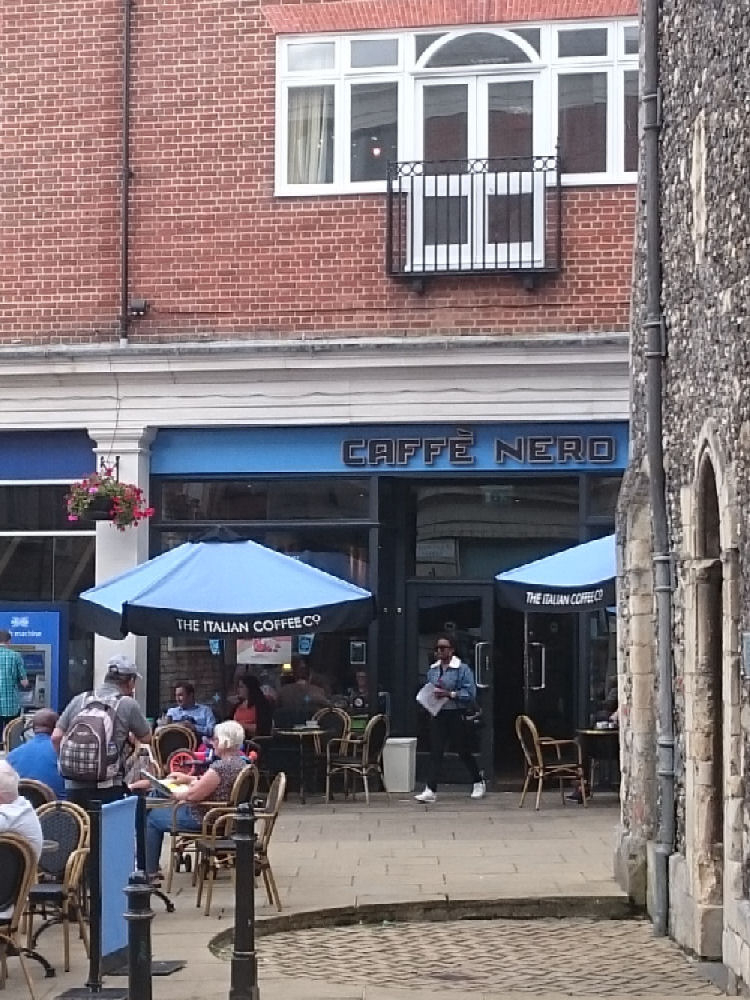
Above photo, August 2017, kindly taken and sent by Rory Kehoe. |
Following war damage the licence was held in suspense, and it was
demolished in 1942.
|
Kentish Gazette, 5 April 1803.
Thursday died, Mrs. Halloday, wife of Mr. John Halloday, of the
"White Lion" public-house, St. George's, in this city.
|
|
Kent Herald, 3 November 1825.
Death.
Oct. 30, Mr. David Gilman, landlord of the "White Lion," St. George's-street,
Canterbury.
|
|
From the Kent Herald, 12 December 1833
Death
A few days since, the infant daughter of Mr. James Gillman, landlord of
the "White Lion," St. George's street, Canterbury.
|
|
From the Historic Canterbury web site www.machadoink.com
1837 "The Druids meet at the White Lion, St. George's, every Monday
evening at nine o'clock."
|
|
From the Kentish Gazette, 16 July 1839.
Burial Society.
A new Society is formed it the "White Lion," on a principle somewhat
similar to the societies already established in this city, and intended
by its promoters to take a course between the others. The societies now
in operation vary considerably from each other in point of expense in
subscription, as well as in the amount of aid in case of decease. The
object of the "White Lion" Institution is to enable those who cannot
afford to belong to the more expensive Society, and who are desirous of
benefiting their surviving relatives to a greater degree than the others
provide for, to secure ample means for a secure interment, without
crippling their means during life to procure it. We understand that a
meeting of the promoters and friends is convened for Thursday evening,
at the Society’s Room at the "White Lion," St. George's-street, to draw
up rules for the public inspection. The Society is expected to be
extensively supported.
|
|
From the Kentish Gazette, 5 November 1839.
Canterbury £20 Burial Society.
The members of this Society held their first Quarterly Meeting at the
"White Lion," St. George’s-street, on Thursday evening, when upwards of
50 members were present. The chairman (Mr. A. Engeham) briefly opened
the business, and the Secretary (Mr. Thomas Souther), stated the
proceedings of the committee during the three months the society has
been established. Two hundred and six members have been enrolled during
that period and not a death has taken place among them. The balance
sheet was read which showed a balance in hand sufficient to meet all
casual expenses. The members, to evince their satisfaction at the
conduct of the society’s officers, carried a unanimous vote of thanks to
the committee and secretary for their exertions since the formation of
the society. Harmony and conviviality was kept up after the business was
closed for a considerable time, and 14 new members were enrolled during
the evening, making a total of 220. There are several additional
candidates for enrolment at the weekly committee meeting on Thursday
evening.
|
|
From the Kentish Gazette, 1 February 1842.
Freemasonry. Celebration of the Duke of Sussex's Birthday.
On Thursday last the United Industrious Lodge of Freemasons (No. 34) of
Canterbury, held a lodge in honour of the day at the "White Lion Inn," in
Saint George's-street. The lodge was opened in due form, and the
brethren afterwards partook of a very excellent repast, placed on the
table in first-rate style by the worthy landlord. A most pleasant
evening was passed. The healths of the Queen, the Grand Master of the
Order, the Prince of Wales, and the Royal Family, together with a
variety of Masonic toasts and sentiments were drunk, and the members
dispersed highly gratified with the proceedings of the day.
|
|
From the Kentish Gazette, 14 June 1842.
T. TAYLOR, WHITE LION, ST. GEORGE’S STREET, CANTERBURY,
INFORMS his Friends and the Sporting World, that he has a FIVE
SHILLINGS’ SWEEPSTAKE for the ensuing Great Doncaster St. Leger. The
Committee hold their Meetings at his House on every MONDAY evening, at
Half-past Eight o’clock, when the company of any gentleman desirous of
entering the Sweepstakes, will be esteemed a favour.
June 10th, 1842.
|
|
From the Kentish Gazette, 12 September 1843.
White Lion £20 Burial Society.
The members of this Society celebrated their fourth anniversary on
Monday evening last by supping together at the Club-house, the "White
Lion," St. George’s-street, in this city; the supper, which was got up
by the worthy host to the utmost satisfaction, was done ample justice
to, and the after evening spent in a very convivial manner. This club
numbers 19 members over and above its original quota of 420.
|
|
From the Kentish Gazette, 25 February 1846.
THOMAS TAYLOR, OF THE "WHITE LION," ST. GEORGE’S STREET, CANTERBURY,
BEGS to acquaint the Gentry and Trade of Canterbury and Vicinity, that
he has, by the advice of his Friends, ENTERED INTO BUSINESS as RAILWAY
CARRIER on his own account, and for that purpose has concluded an
arrangement with Mr. MOORE, of the "NEW INN," OLD CHANGE, CITY, LONDON,
and "TALBOT INN," BOROUGH, for the reception and delivery of all his
Parcels. T. T. therefore respectfully and confidently appeals to his
fellow-citizens for a share of their patronage; faithfully assuring them
that every assiduity and attention will be paid by him, to the safe and
speedy delivery of the Goods committed to his care.
The Scale of Prices for carriage to and from London, will be the same as
contracted for by him with the Trade, viz.:—
Parcels not exceeding 14lbs ...... 0s 8d.
Ditto 15 - 28 lbs........ 0s 11d
Ditto 29 - 56 lbs......... 1s 2d
Canterbury Porterage included.
And all Parcels above that weight at the rate of Two Shillings per Cwt.
Be particular to order all London parcels to the "New Inn," Old Change,
City, or "Talbot Inn," Borough, to prevent additional expense. Orders
received, as usual, at the "White Lion," St. George’s Street,
Canterbury.
|
|
From the Kentish Gazette, 5 May 1846.
White Lion £20 Burial Society.
The Quarterly Committee Meeting of this club, was holden at the above
house, in Canterbury, on Thursday evening last, for the purpose of
transacting the usual business, when the secretary reported that during
the past quarter, there had been three deaths, and one withdrawal, and
that there was one death uncollected, Mr. Amos Miller, formerly cook at
the "Fountain Hotel." That the sum in hand was £12, over and above the
£20 always in readiness in case of the death of a member. Ten members
were enrolled during the evening, a few vacancies remaining for healthy
persons between the ages of 25 and 45 years.
|
|
Canterbury Journal 21 October 1848.
East Kent Quarter Sessions, St. Augustines, yesterday, before J.B.
Wildman Esq.
Thomas Cook, alias Stickals, 44, John Stroud, 42, George Marshall,
32, and Henry King, 51, charged with having, on the 3rd August,
stolen nine quarters of malt, value £30, the property of Thomas
Rigden, of Newington, next Hythe.
The prisoners, who had been committed to Maidstone gaol, had been
brought thence for trial. A great number of witnesses had been
subpoenaed. The extent to which robberies of this description had
been carried increased the degree of interest felt in the town, the
more especially as most of the parties were well-known, two of them
having formerly kept beer shops here, and one of the others being a
market gardener of Littlebourne, who was always thought to be an
industrious and honest man.
Messrs. Horn and Tassell were for the prosecution, and Messrs. Rose
and Russell for the defence.
Mr. Horn, in opening the case for the prosecution, observed that it
was not necessary, in order to convict all the prisoners, that they
should have been bodily engaged in stealing the malt. It was
sufficient if they were found so near as to be able to assist in it.
It was necessary to bring home the guilt of the actual thieves,
before others could be charged with aiding and abetting. Cook and
Marshall resided at Canterbury; Stroud at Littlebourne; and King at
Ramsgate. On the morning previous to the robbery, as he would show,
Cook, King and Marshall were together at the "Chance" public house in
Canterbury. In the afternoon of the same day, two, if not three of
them, were at the "White Lion" in the same place; and on the evening
prior to the robbery, about half past eight o'clock, King and
another person were together at Elmsted, having with them a horse
and cart, which had been hired of a person in Canterbury. The
prisoners had two horses and carts with them on the occasion of the
robbery, one of them belonging to Stroud. The learned counsel
produced a plan of the premises, to show the situation in which the
prisoners were seen, especially Marshall, to lead to the inference
that he was aiding and abetting in the removal of the stolen
property; and after detailing a variety of particulars connected
with the concert of the prisoners, together with their arrest,
proceeded to call the following witnesses:
J.B. Horn, assistant to Mr. Messenger, architect, of Folkestone, was
examined merely as to the correctness of the plan produced, as
regarded distances.
H. Rigden, maltman to prosecutor, deposed that on Wednesday, the 2nd
of August, he left the malthouse locked and barred. There were forty
or fifty quarters of malt in bin, but none in sack. Next morning he
found nineteen sacks, not belonging to his master, filled with malt.
Jno. Attwood, landlord of the "Chance," at Canterbury, knew the
prisoners; Cook, Marshall and King were at his house on the 2nd
August between ten and eleven o'clock; Cook and Marshall lived at
Canterbury, Stroud at Littlebourne, and King at Ramsgate. King met
with an accident at his house on the previous Tuesday night, by
which he was marked across the nose, and he put on a brown patch,
which he had on the Wednesday.
Thomas Taylor, landlord of the "White Lion," Canterbury, knew the
prisoners Cook, Stroud and Marshall, and spoke positively of the
former two being at his house on the afternoon of the 2nd August; he
could not state so positively in respect of the last mentioned,
though a man came in with a patch on his nose, but he believed that
he did not communicate with the others.
Cross-ezamined: Never, to his knowledge, before saw King, and,
therefore, was not able to say that he was the one who came with the
patch on his nose.
Benj. Barnes, licensed to let horses at Canterbury, remembered the
prisoner Cook hiring of him a bay horse in the afternoon of the 2nd
August, for the purpose, as he stated, of going about six miles into
the country. The horse not being returned, he made inquiry, and
found it at prosecutor's house a week after.
Thos. Philpot, a boy in the employ of Mr. Church, at the "George," at Elmsted,
(Stelling Minnis) deposed to two men coming to the
"George" with a bay horse,
about half past eight on the day in question, one of them having a
patch on his nose. He pointed out the prisoner King as one of the
men, who bore the patch; he believed Cook was the other. They came
from Canterbury, and told Mr. Church they were going to Hythe, in
which direction they went. They wore white coats, or gaberdines,
like those produced, though he was not quite sure; and did not stay
long.
Cross-examined: Could not recollect, when before the magistrate,
whether they were gaberdines or coats worn by the men.
Re-examined: Only King was before the magistrate; had not seen Cook
since that night.
James Fisher, shepherd to T. Rigden, of Cheriton, was at the "Star,"
at Newington, on the 2nd August; had been to a cricket match, and on
leaving the "Star" saw two carts with horses standing by the side of
the road, about 100 yards from the "Star." A man, who was with them,
asked if the people were all gone from the "Star," which raised his
suspicion, and he proceeded to Longport Farm, about 150 yards from
the "Star," and there saw Sawkins, who agreed to watch with him
(witness). Witness then proceeded towards the malthouse which was
about a quarter of a mile from the Star. Hearing a noise, as he
thought, within the malthouse or outside, he proceeded to the gate
near the malthouse, and saw a man come from it with a sack on his
back. He rushed towards the man, who dropped the sack and ran away
to Mr. Dunn's stack-yard; after that he saw another man, whom he
pointed out to be Stroud, come out of the malthouse with another
sack on his back. Witness collared him and threw him down, on which
another man came up and threatened him with a violent expression if
he (witness) did not let his mate go. A third also struck him two
blows. Witness did not let the one go of whom he had hold, but
called loudly for assistance. They scuffled till they got into the
river, where witness held him (the prisoner Stroud) full twenty
minutes till assistance was rendered by Mr. Dunn, and then they took
the prisoner to the "Star," and delivered him into the hands of Rye,
the constable. On their way thither they saw Marshall on the road
with two horses and carts, at the place where he first saw him. He
took him also into custody and delivered him into the hands of Rye.
Cross-examined: Saw some man with the carts as soon as he (witness)
left the "Star;" it was a light night; did not see the man who ran
away go into Mr. Dunn's stack-yard.
James Dunn, farmer at Newington, who was also at the "Star" on the
night in question, deposed to seeing the two horses and carts
standing by the side of the road, which excited his suspicions, and
he went back and asked him for whom he was waiting; he replied his
“governor”. Witness returned to the "Star," but on hearing a hallooing
went towards the malthouse, when he met two of the party who had
been at the "Star," with a man who was stated to be King. On reaching
the malthouse he found Fisher and Stroud in the river. Witness
helped them out and went to Mr. Rigden's. On going to his father's
stack-yard he found a man, who proved to be Cook, behind a wheat
stack. He spoke to him three times but received no answer, on which
witness collared him, who in return kicked him (witness). Witness
threw him down, and with the aid of others gave him into Rye's
custody. Witness, with others, afterwards secured Marshall, who was
standing by the side of the horses and carts. Next morning witness
found a bundle of clothes, consisting of two coats, in a field
adjoining the road where the carts stood. Witness also took the
other coats produced out of the carts.
Cross-examined: Witness was of the cricketing party, but had not
drunk more than to excite him a little.
John Oldham, carpenter of Newington, who was one of the party at the
"Star" on the day aforementioned, corroborated the evidence as to
seeing Marshall with the horses and carts, and asked him if he had
got a waiting job, to which he replied in the affirmative, and
stated that the party was at the "Star." On that witness repaired
again to the Star, and finding that there was no-one there for whom
he could be waiting, returned towards the cart with the last
witness, in doing which he heard a hallooing in the direction of the malthouse, and met King, who was walking very fast towards
Folkestone, and was out of breath. In reply to a question from
witness he said he was going to Hythe, but witness told him he was
in the wrong direction; and on his walking fast, witness bade him
not to walk so fast, as he heard a hallooing, which he supposed the
prisoner did also, but he said he did not, as he was deaf. On
witness collaring him he said he was in a hurry, and wanted to get
off. He replied in answer to a question by another person that he
knew nothing of Marshall of the carts; and on detaining him twenty
minutes, witness let him go again. He had no doubt of the prisoner
King being the same man. Witness on a subsequent day, the 14th Aug.,
went to Ramsgate, and there identified King as the man whom he had
seen in the road. In reply to a question whether or not he knew
anything of the malt robbery, he replied in the negative, and Kemp
then took him into custody. He had a good opportunity of seeing King
when detaining him on the 2nd Aug.; he had a patch on his nose. When
taking him the second time he had a scar on his nose at the same
place where the patch had been.
George Rigden, son of prosecutor, who was at the "Star" on the evening
in question, corroborated the evidence as to seeing Marshall in the
way described, by the side of the road and the conversation that
took place with him, as to its being suspicious that he was there
with the carts and hearing the hallooing; together with King's
coming up, with a brown patch on his nose, and his subsequent arrest
at Ramsgate. He spoke positively as to the identity of King being
the same man who was met on the road.
Cross-examined: King had a mark on his nose when apprehended at
Ramsgate; that was a part of his reason for believing him to be the
same person he had met on the road, beside which a lantern was held
up to his face when on the road.
Thos. Kemp, constable at Hythe, who went with the last two witnesses
to Ramsgate on the 14th of August, corroborated their testimony. On
taking Cook, Stroud and Marshall to Maidstone, Cook said they had
thrown some garments over the hedge. King did not appear deaf when
apprehended.
James Rye, constable at Newington, received into his custody on the
night in question Cook, Stroud and Marshall. Picked up a pot near
the "Star" door, when Cook said “It appears someone was going to serve
that pot as we were going to serve the malt”. Found a box of Lucifer
matches on Cook.
Cross-examined: Was quite sure the expression was what he had
stated, and that Cook used the word “we” and not “they”.
Thos. Rigden, the prosecutor, deposed to the malt in the malthouse
being his property. Had seen the notices put in, sent by Mr.
Delasaux on the behalf of Cook and Stroud, claiming the two carts
and one horse which were in his (witness's) possession, being those
which were taken on the night in question. On one of the carts were
the words “John Stroud, fruiterer, Littlebourne”. The horse and
carts were still in his (witness's) possession. (The notices were
then read threatening the prosecutor with actions of trover if the
horse and carts were not given up.)
Cross-examined: Was ordered by the committing magistrate to detain
the horse and carts.
Henry Rigden, son of the prosecutor, who went to the malthouse after
seeing the prisoners safely lodged at the "Star," found the door
unlocked, two sacks filled with malt outside, and seventeen others
filled inside. One of them bore the name “Collard, Hoath Mill, 45”,
and the other “J. Sharpe, Canterbury”. None of the sacks belonged to
his father.
Mr. Rose objected to this evidence relating to the sacks when none
were produced.
Examination continued: Found a dark lantern in the malthouse, and a
cap outside. There were about nineteen and a half quarters of malt
in the sacks, the value being about £30.
Mr. Rose, in defence, did not attempt to dispute the evidence as
regarded Stroud, but submitted there was not sufficient to convict
either of the other three; in respect of King that there was not
sufficient identity, and that as regarded Cook it was inexplicable
how, if he had been concerned in the robbery, he should have
remained so long in the stack-yard, as was alleged, after the man
having been seen go thither, and his being taken out. In reference
to Marshall also, Mr. R. contended that he was not found to have
been sufficiently near to render assistance as he was above a
quarter of a mile from the place whence the malt was taken. The
learned counsel then called two witnesses to speak to Stroud's
previous good character.
The Chairman, in summing up, directed especial attention to Cook's
expression on being taken to the "Star" as sufficient proof of his
guilt; that King was amply identified, beside which he was running
very much out of breath in the opposite direction whence the call
for help came; and he directed attention to the account he gave of
himself when accosted as to where he was going, and his pretence of
deafness when there was no proof of it. As regarded Marshall there
was no doubt that he was in the road with the horses and carts, with
the view of rendering assistance on the removal of the malt, which
he substantiated by reading the law on the question, pointing out
that if a man watched at a convenient distance for the purpose of
preventing surprise to his companions and to favour their escape, or
if necessary to come to their assistance, the knowledge of which was
calculated to give them additional confidence, he was present aiding
and abetting.
The jury, after a very brief consultation, returned a verdict of
Guilty against all the prisoners.
The Chairman expressed his perfect concurrence with the verdict, and
in passing sentence said it was with great pain he addressed the
prisoners, as the crime of which they had been found guilty was one
of a most serious nature, which they had evidently conducted in a
way that proved to the Court they had made it their business, and
that it was by no means the first attempt they had made in such a
course. The planning of the robbery and the manner in which it had
altogether been conducted convinced the Court that the prisoners
were old offenders in the crime of which they stood convicted. It
was absolutely that the desperate attempts which were continually
made in this way on the property of the country should be put a stop
to, and he knew of no other way in which that could be but by making
a most serious example of those cases which, like this, were brought
home. The sentence that he was directed by the Court to pass was
that each of them be transported beyond the seas to the place which
Her Majesty should think fit, for the term of ten years.
The severity of this sentence produced a great sensation in Court.
The culprits had scarcely left the dock before they were recalled,
when the Chairman stated that he had been in error in thinking that
he could not pass a lighter sentence than ten years' transportation.
Having been set right, he was directed to sentence the prisoners
severally to be transported seven years. This, sorrowful as it was,
came as some relief to the convicts, who, in the moment or two that
had elapsed since the first passing of the sentence had suffered
something, as their countenances indicated.
The trial lasted nearly four hours.
|
|
Kent Herald 26 October 1848
East Kent Quarter Sessions, Friday: Before J.B. Wildman Esq.
Thomas Cooke, alias Stickals, 44, John Stroud, 42, George Marshal, 32, and Henry
King, 51, charged with having, on the 3rd of August, stolen nine quarters of
malt, value £30, the property of Thomas Higden, Newington, next Hythe. The
prisoners, who had been committed to Maidstone gaol, had been brought thence for
trial. A great number of witnesses had been subpoenaed. The extent to which
robberies of this description have been carried, increased the degree of
interest generally felt, the more especially as most of the parties were well
known, two of them having formerly kept beer-shops here, and one of the others
being a market-gardener of Littlebourne, who was always thought to be an
industrious and honest man.
Messrs. Horn and Tassell were for the prosecution, and Messrs. Rose and Russell
for the defence.
Mr. Horn, in opening the case for the prosecution, observed that it was not
necessary in order to convict all the prisoners, that they should have been
bodily engaged in stealing the malt. It was sufficient if they were found so
near as to be enabled to assist in it. It was necessary to bring home the guilt
of the actual thieves, before others could be charged with aiding and abetting.
Cooke and Marshall resided at Canterbury; Stroud at Littlebourne, and King at
Ramsgate. On the morning previous to the robbery, as he would show, Cooke, King,
and Marshall, were together at the "Chance" public-house, in Canterbury. In the
afternoon of the same day, two, if not three, of them, were at the White Lion,
in the same place; and on the evening prior to the rubbery, about half-past
eight o’clock, one of them, King, and another person, were together at Elmsted,
having with them a horse and cart, which had been hired of a person in
Canterbury. The prisoners had two horses and carts with them on the occasion of
the robbery, one of them belonging to Stroud. The learned counsel produced a
plan of the premises, to show the situation in which the prisoners were seen,
especially Marshall, to lead to the inference that he was aiding and abetting in
the removal of the stolen property; and after detailing a variety of particulars
connected with the concert of the prisoners, together with their arrest,
proceeded to call the following witnesses:-
J. B. Horn, assistant to Mr. Messenger, architect, of Folkestone, was examined
as to the correctness of the plan produced, as regarded distances.
H. Rigden, maltman to prosecutor, deposed that on Wednesday, the 2nd of August,
he left the malt-house locked and barred. There were forty or fifty quarters of
malt in bin, but none in sack. Next morning found nineteen sacks, not belonging
to his master, filled with malt.
John Attwood, landlord of the Chance, at Canterbury, knew the prisoners; Cooke,
Marshall, and King, were at his house on the 2nd of August, between ten and
eleven o’clock; Cooke and Marshall lived at Canterbury, -Stroud at Littlebourne,
and King at Ramsgate. King met with an accident at his house on the previous
Tuesday night, by which he was marked across the nose, and be put on a brown
patch, which he had on the Wednesday.
Thomas Taylor, landlord of the White Lion, Canterbury, knew the prisoners Cooke,
Stroud, and Marshall, and spoke positively of the former two being at his house
in the afternoon of the 2nd August; he could not state so positively in respect
of the last mentioned, though a man came in with a patch on his nose, but he
believed that he did not communicate with the others.
Cross examined: Never, to his knowledge, before saw King, and, therefore, was
not able to say that he was the one who came with the patch on his nose.
Benjamin Barnes, licensed to let horses at Canterbury, remembered the prisoner
Cooke hiring of him a bay horse, in the afternoon of the 2nd August, for the
purpose, as be stated, of going about six miles into the country. The horse not
being returned, he made inquiry, and found it at prosecutor's house a week
after.
Thomas Philpot, a boy in the employ of Mr.Church, at the George, at Elmsted,
deposed to two men coining to the George with a bay horse, about half-past
eight, on the day in question, one of them having a patch on his nose. He
pointed out the prisoner King as one of the men, and who bore the patch; he
believed Cooke was the other. They came from Canterbury, and told Mr. Church
they were going to Hythe, in which direction they went. They wore white coats or
gaberdines, like those produced, though he was not quite sure, and did not stay
long.
Cross-examined: Could not recollect, when before the magistrates, whether they
were gaberdines or coats worn by the men.
Re-examined: Only King was before the magistrate; had not seen Cooke since that
night.
James Fisher, shepherd to T. Rigden, of Cheriton, was at the Star, at Newington,
on the 2nd August; had been to a cricket match, and on leaving the Star saw two
carts with horses standing by the side of the road, about 100 yards from the
Star. A man, who was with them, asked if the people were all gone from the Star,
which raised his suspicion, and he proceeded to Longport Farm, about 150 yards
from the Star, and there saw Sawkins, who agreed to watch with him (witness).
Witness then proceeded to the malt-house which was about a quarter of a mile
from the Star. Hearing a noise as he thought within the malt-house, or outside,
he proceeded to the gate near the malt-house, and saw a man come from it with a
sack on his back. He rushed towards the man who dropped the sack and ran away
towards Mr. Dunn’s stack-yard; after that he saw another man, whom he pointed
out to be Stroud, come out of the malt-house with another sack on his back.
Witness collared him, and threw him down, on which another man came up and
threatened him, with a violent expression, if he (witness) did not let his mate
go. A third also struck him two blows. Witness did not let the one go of whom he
had hold, but called loudly for assistance. They scuffled till they got into the
river, where witness held him (the prisoner Stroud) full twenty minutes till
assistance was rendered by Mr. Dunn, and then they took the prisoner to the
Star, and delivered him into the hands of Rye, the constable. On their way
thither he saw Marshall on the road with two horses and carts, at the place
where he first saw him. He took him into custody and delivered him into the
hands of Rye.
Cross-examined: Saw some man with the carts as soon as he (witness) left the
Star; it was a light night; did not see the man who ran away go into Dunn's
stack-yard.
James Dunn, farmer at Newington, who was also at the Star on the night in
question, deposed to seeing the two horses and carts standing by the side of the
road, which excited his suspicions, and be went back and asked him for whom he
was waiting; he replied his “governor.” Witness returned to the Star, but on
hearing a hallooing went towards the malt-house, when he met two of the party
who had been at the Star with a man who was stated to be King. On reaching the
malt-house he found Fisher and Stroud in the cut. Witness helped them out, and
went to Mr. Rigden’s. On going to his father’s stack-yard he found a man, who
proved to be Cooke, behind a wheatstack. He spoke to him three times but
received no answer; on which witness collared him, who in return kicked him
(witness). Witness threw him down, and with the aid of others gave him into
Rye’s custody. Witness, with others, afterwards secured Marshall, who was
standing by the side of the horses and carts. Next morning witness found a
bundle of clothes, consisting of two coats, in a field adjoining the road where
the carts stood. Witness also took the other coats produced out of the carts.
Cross-examined: Witness was of the cricketing party, but had not drunk more than
to excite him a little.
John Oldham, carpenter, of Newington, who was one of the party at the Star on
the day aforementioned, corroborated the evidence as to seeing Marshall with the
horses and carts, and asking him if he had got a waiting job; to which he
replied in the affirmative, and stated that the party was at the Star. On that
witness repaired again to the Star, and finding that there was no one there for
whom he could be waiting, returned towards the cart with the last witness, in
doing which he heard a hallooing in the direction of the malt-house, and met
King, who was walking very fast towards Folkestone, and was out of breath. In
reply to a question from witness, he said he was going to Hythe, but witness
told him he was in the wrong direction; and on his walking fast, witness bade
him not to walk so fast, as be heard a hallooing, which he supposed the prisoner
did also; but he said he did not, as he was deaf. On witness collaring him, he
said he was in a hurry and wanted to get off. He replied in answer to a question
by another person that he knew nothing of either Marshall or the carts; and,
after detaining him twenty minutes, witness let him go again. He had no doubt of
the prisoner King being the same man. Witness on a subsequent day, the 14th
Aug., went to Ramsgate, and there identified King as the man whom he had seen in
the road. In reply to a question whether or not he knew anything of the malt
robbery, he replied in the negative; and Kemp then took him into custody. Had a
good opportunity of seeing King when detaining him on the 2nd Aug.; he had a
patch on his nose. When taking him the second time he had a scar on his nose, at
the same place where the patch had been.
George Rigden, son of prosecutor, who was at the Star on the evening in
question, corroborated the evidence as to seeing Marshall in the way described,
by the side of the road and the conversation that took place with him, as to its
being suspicious that he was there with the carts and hearing the hallooing;
together with King's coming up, with a brown patch on his nose, and his
subsequent arrest at Ramsgate. He spoke positively as to the identity of King,
being the same man who was met on the road.
Cross-examined: King had a mark on his nose when apprehended at Ramsgate; that
was a part of his reason for believing him to be the same person who had been
met on the road; beside which a lantern was held up to his face when on the
road.
Thomas Kemp, constable at Hythe, who went with the last two witnesses to
Ramsgate on the 14th of August, corroborated their testimony. On taking Cooke,
Stroud and Marshall to Maidstone, Cooke said they had thrown some garments over
the hedge. King did not appear deaf when apprehended.
James Rye, constable at Newington, received into his custody, on the night in
question, Cooke, Stroud, and Marshall. Picked up a pot near the Star door, when
Cooke said “It appears someone was going to serve that pot as we were going to
serve the malt.” Found a box of lucifer matches on Cooke.
Cross-examined: Was quite sure the expression was what he had stated, and that
Cooke used the word “we,’’ and not “they.”
Thos. Rigden, the prosecutor, deposed to the malt in the malt-house being his
property. Had seen the notices put in, sent to Mr. Delasaux on the behalf of
Cook and Stroud, claiming the two carts and one horse which were in his
(witness’s) possession, being those which were taken on the night in question.
On one of the carts were the words “John Stroud, fruiterer, Littlebourne.” The
horse and carts were still in his (witness's) possession. (The notices were then
read threatening the prosecutor with actions of trover if the horse and carts
were not given up).
Cross-examined: Was ordered by the committing magistrate to detain the horse and
carts.
Henry Rigden, son of the prosecutor, who went to the malt house after seeing the
prisoners safely lodged at the Star, found the door unlocked, two sacks filled
with malt outside, and seventeen others filled inside. One of them bore the name
“Collard, Hoath Mill, 45,” and the other ”J. Sharpe, Canterbury.’’ None of the
sacks belonged to his father.
Mr. Rose objected to this evidence relating to the sacks when none were
produced.
Examination continued: Found a dark lantern in the malt-house and a cap outside.
There were about 19½ quarters of malt in the sacks, the value being about £30.
Mr. Rose, in defence, did not attempt to dispute the evidence as regarded
Stroud; but submitted there was not sufficient to convict either of the other
three. In respect of King that there was not sufficient identity, and that as
regarded Cook it was inexplicable how, if he had been concerned in the robbery,
he should have remained so long in the stack-yard, as was alleged, after the man
having been seen go thither, and his being taken out. In reference to Marshall
also, Mr. R. contended that he was not found to have been sufficiently near to
render assistance as he was above a quarter of a mile from the place whence the
malt was taken. The learned counsel then called two witnesses to speak to
Stroud's previous good character.
The Chairman, in summing up, directed especial attention to Cooke’s expression
on being taken to the Star as sufficient proof of his guilt; that King was amply
identified, beside which he was seen running very much out of breath in the
opposite direction whence the call for help came; and he directed attention to
the account he gave of himself when accosted as to where he was going, and his
pretence of deafness when there was no proof of it. As regarded Marshall there
could be no doubt that he was in the road with the horses and carts, with the
view of rendering assistance in the removal of the malt, which he substantiated
by reading the law on the question, pointing out that if a man watched at a
convenient distance for the purpose of preventing surprise to his companions and
to favour their escape, or if necessary to come to their assistance, the
knowledge of which was calculated to give them additional confidence, he was
present aiding and abetting.
The jury, after a very brief consultation, returned a verdict of Guilty against
all the prisoners.
The Chairman expressed his perfect concurrence in the verdict; and in passing
sentence, said it was with great pain he addressed the prisoners, as the crime
of which they had been guilty was one of a most serious nature, which they had
evidently conducted in a way that proved to the Court they had made it their
business, and that it was by no means the first attempt they had made in such a
course. The planning of the robbery and the manner in which it had altogether
been conducted convinced the Court that the prisoners were old offenders in the
crime of which they stood convicted. It was absolutely necessary that the
desperate attempts which they continually made in this way, on the property of
the country should be put a stop to; and he knew of no other way in which that
could be, but by making a most serious example of those cases which, like this,
were brought home. The sentence which he was directed by the Court to pass was,
that each of them be transported beyond the seas to the place which her Majesty
should think fit, for the term of ten years.
The severity of this sentence produced a great sensation in Court. The culprits
bad scarcely left the dock before they were re-called, when the Chairman stated
that he had been in error, in thinking that he could not pass a lighter sentence
than ten years’ transportation. Having been set right, be was directed to
sentence the prisoners severally to be transported seven years. This, sorrowful
as it was, came as some relief to the convicts, who, in the moment or two that
had elapsed since the first passing of the sentence, had suffered something, as
their countenances indicated.
The trial lasted nearly four hours.
|
|
Kentish Gazette, 13 February 1849.
A special meeting of the "White Lion" £20 Burial Society was held on
Tuesday evening, to receive a statement of the Society's condition, and
fill some vacant offices. Mr. T. Southee was appointed to the office of
Vice-President, in the room of Mr. Scriven; and Mr. J. W. Pilcher, who
had been appointed Secretary, in the room of Mr. Taylor, produced a
statement, from which it appeared that the Club consists of four hundred
members, and has in hand sufficient funds to meet all demands. The
meeting expressed itself satisfied with the manner in which the Club had
been conducted, and passed votes of thanks to the Chairman and
Committee.
|
|
Kentish Gazette, 18 February 1851.
DEATH.
Taylor:- Feb 15., after a long and excruciating suffering, being with a
truly Christian spirit of piety and resignation, Mary, the
husband of Mr. Thomas Taylor, of the "White Lion," St. George's Street,
Canterbury, and third daughter of the late William
Stillard, of High Street, aged 48.
|
|
Kentish Gazette, 2 December 1851.
On Thursday evening the members of the Canterbury Friendly Debating
Society celebrated their fourth anniversary by dining together at the
"White Lion Inn," St. George’s. After the dinner the principles and
objects of the Society were set forth by the various speakers; and
harmony and conviviality prevailed till a late hour.
|
|
Canterbury Journal, Kentish Times and Farmers' Gazette, Saturday 30 April 1904.
Daisy Again. Assaulting a Publican.
At the Canterbury Police Court on Saturday, before Messrs, Mason, Hunt,
and Sadler, William Daisy was charged with assaulting Albert Ernest
Busby, landlord of the "White Lion," St. George's Street, and also with
assaulting P.C. Holness.
Arthur Ernest Busby, landlord of the "White Lion," St. George's Street,
Canterbury stated that at about 11:05 on the previous night the prisoner
came to his house and wanted a bed for the night. He told him he was
full up and that he could not take him up. Prisoner than said he should
demand a bed. Witnessed requested him to leave many times, but he would
not. He then struck witness on the left cheek with his fist. Witness
closed with him and with assistance got him outside. When outside they
both fell onto the pavement. Prisoner was drunk.
P.C. Holness deposed that at 11:15 on the previous night he was at the
top of St. George's Street when he heard a disturbance in front of the
"White Lion Inn." He went there and found prisoner, who had a whip in
his hand, threatening to bash everybody's brains out. Witness persuaded
him to go away, but the prisoner returned and threatened witness. he
struck witness over the shoulder with his whip. Witnessed took the whip
away and threw the prisoner to the ground. With the assistance of P.C.
Goddard he took the prisoner into custody. He was very violent all the
way to the police station. He was drunk.
Prisoner said he came from Ramsgate with a load of fish on the previous
evening and he was looking for lodgings for the night.
Chief Constable Farmery proved several previous convictions against
prisoner at Canterbury and Margate.
The Chairman said it was very disgraceful conduct. Publicans must be
protected in the discharge of their business and so must the police.
Defendant:- I do not very often come up here.
The Chairman:- We are glad of it. (Laughter.) You will be sentenced to
one months' imprisonment for each offence. The sentences are to run
consecutively.
|
LICENSEE LIST
HALLODAY John 1803+
GILLMAN David 1824-30/Oct/1825 dec'd

GILLMAN Mary 1828+

GILLMAN James 1832-33+

GILLMAN Mary Mrs 1838+

TAYLOR Thomas 1840-51+
  
HOPPER Henry 1858-68+
(age 39 in 1861 ) )
 
HOPPER Mrs Caroline 1871-74+ (age 49 in 1871 ) )
 
COX Charles 1881-82+ (age 33 in 1881 ) )
 
BUSBY Alfred 1889-91+ (also smith age 48 in 1891 ) )

BUSBY Albert Ernest 1891-1904+ (age 27 in 1901 ) )
  
GRANT William 1913-22+
  
MOORE William Samuel (AKA Chiefy)
 1930-Oct/34
1930-Oct/34
 
CLAYSON W P 1938+

https://pubwiki.co.uk/WhiteLion.shtml
 From the Pigot's Directory 1824 From the Pigot's Directory 1824
 From the Pigot's Directory 1828-29 From the Pigot's Directory 1828-29
 From the Pigot's Directory 1832-33-34 From the Pigot's Directory 1832-33-34
 Stapleton's
Guide 1838 Stapleton's
Guide 1838
 From the Pigot's Directory 1840 From the Pigot's Directory 1840
 From Bagshaw Directory 1847 From Bagshaw Directory 1847
 From Melville's Directory 1858 From Melville's Directory 1858
 From the Post Office Directory 1862 From the Post Office Directory 1862
 Greens
Canterbury Directory 1868 Greens
Canterbury Directory 1868
 From the Post Office Directory 1874 From the Post Office Directory 1874
 Census Census
 From the Post Office Directory 1882 From the Post Office Directory 1882
 From the Post Office Directory 1891 From the Post Office Directory 1891
 From the Post Office Directory 1903 From the Post Office Directory 1903
 From the Kelly's Directory 1903 From the Kelly's Directory 1903
 From the Post Office Directory 1913 From the Post Office Directory 1913
 From the Post Office Directory 1922 From the Post Office Directory 1922
 From the Post Office Directory 1930 From the Post Office Directory 1930
 From the Post Office Directory 1938 From the Post Office Directory 1938
 Historic
Canterbury web site www.machadoink.com Historic
Canterbury web site www.machadoink.com
 From the Dover Express From the Dover Express
|








